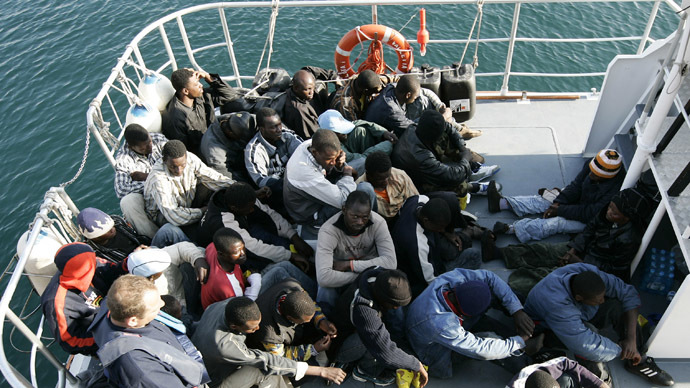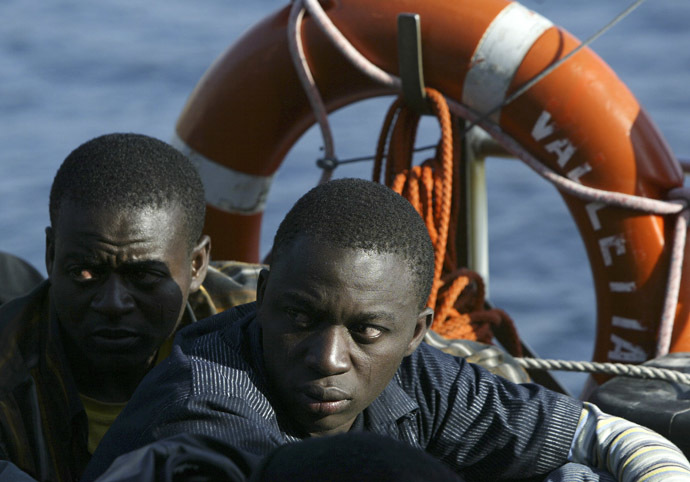Mediterranean is a cemetery with Brussels as its undertaker

“A huge failure” is the best way to describe EU immigration policies. Almost daily, we witness the gruesome body-count in the Mediterranean which has become a cemetery for migrants from conflict zones who drowned on their way to EU to seek refuge.
It’s a cemetery of the innocent, for which the European states can’t escape their responsibilities.
Migrants and refugees are escaping from war, poverty and persecution. They are fleeing from Syria, Gaza, and the myriad African conflicts, with the sole objective of a better life in Europe. They face dangerous journeys and ruthless smugglers, they die, they disappear swallowed up by the waters of the Mediterranean. For the European institutions they are not people – they are only numbers.
Since 1988 at least 21,344 people have died on the borders of Europe: of these only 2,352 in 2011, at least 590 in 2012, 801 in 2013 and more than 2,500 in the first nine months of 2014.
They are victims of the repression of freedom of movement, victims that weigh on the conscience of every European citizen, victims of a security-centric view of immigration and ongoing human rights violations.
The EU responded to the increasing inflow of migrants and the growing number of casualties among them with an iron fist, raising further barriers on their border, relegating migrants to detention centers similar to prisons and deporting migrants to their countries of origin, violating international laws.
Frontex has been the EU’s answer to immigration. The European Agency for the Management of the External Borders of the Member States of the European Union (Frontex) became operational in May 2005 and its main purpose was to improve the management of the external borders of the EU member states and promote operational coordination between them. Frontex assists states in training their border guards, follows the developments in research relevant to the control and surveillance of external borders and coordinates joint deportation flights. The initial budget of the agency was € 6,000,000, while in 2013 it received over € 90,000,000 to finance its activities. Its autonomy allows a decision-making capacity regarding the development of research, projects and operations.
The failure of Frontex is in front of everybody’s eyes. And it’s for this reason that several months ago Italy, which is not blameless in its management of migration inflows, had to set up a program of coastal patrols called Mare Nostrum. This is a patrol for humanitarian purposes to reduce the number of victims of the crossings, carried out only by the Italian government with the total disinterest of the European Union and its member states.
After some controversy and much pressure, a few weeks ago the EU Commissioner Cecilia Malmström announced that the EU would help Italy in its efforts in the Mediterranean with a new program: Frontex Plus. The program depends on the resources made available by the member states and it needs to be made clear from the start the way in which the mandate and the mission will be adapted to the operations whose aim must be to save lives and ensure access to protection to those who need it, rather than to control the borders and prevent illegal immigration.
Thousands of migrants got drown before the EU finally started a discussion on what exactly they could do to try to stop the deaths in the Mediterranean Sea.

But can a new version of a bankrupt program be the solution? Especially if this is a program that has had very little transparency since its inception. With Frontex, Europe has deployed disproportionate measures to fight an enemy who is not a real enemy: migrants. What guarantees does the agency offer in terms of ensuring the respect of migrants’ human rights during its operations? And who is responsible in the case of a violation of fundamental rights during Frontex operations: is it the agency itself, the state hosting the operation or the state whose border guards have committed the violation?All these are questions without an answer.
Moreover, Frontex Plus will operate in international waters, staying on this side of that marine line, closer to the coast of Africa, where there have been numerous tragedies in past years. And it’s not a joke! The European Union, focusing on the “security first” approach gives rise to human trafficking and by making legal migration channels less and less accessible it pushes migrants towards those dangerous routes and the use of smugglers.
And the situation will only get worse as the abysmal socio-economic disparities between countries and peoples of the world, environmental crises, the uncontrollable proliferation of local and regional wars and mass persecutions, due to political, ethnic and religious causes does not seem near to an end.
The fighting in Syria has forced 250,000 Syrian refugees to flee to Egypt. Tens of thousands of these people are waiting for a passage to Europe. The conflict in Gaza has added more people to these numbers: most of the refugees on the boat that sank off the coast of Malta a couple of weeks ago were Palestinians from Gaza.
The EU must change its approach. This implies the reconversion of its security first policies towards reception policies and the respect of international obligations in the field of asylum. We must not forget that migrants are fleeing from their countries because of political, economic and agricultural decisions made, often, in our countries.
European leaders must do more to make available to migrants and refugees safe and legal access to international protection in the European Union as the European countries have so far have a paltry number of places for the resettlement of refugees fleeing from conflicts such as the Syrian one.
A possible solution, the one proposed by UNHCR, involves the possibility of applying for asylum from a country of transit on the migration routes. It means to anticipate geographically; legally and diplomatically the asylum requests in the countries (Jordan, Lebanon, Tunisia, Egypt, Algeria, and Morocco) where migrants are in transit through a network of centers in which asylum seekers could formalize the procedure for refugee status. This could have two important consequences: it would allow a significant number of refugees to reach Europe by legal and safe means, avoiding the underwater graveyard that the Mediterranean has become, and enable greater and more rational distribution of asylum seekers in European countries at the time of their request for protection.
This would be a wise solution, the first step towards a radical change of direction from the policies that have only done damage so far. But as often happens in the EU, as well as in the UN headquarters in New York City and in Washington DC, what is reasonable is not approved. So it is pointless to create false illusions.
The statements, views and opinions expressed in this column are solely those of the author and do not necessarily represent those of RT.
The statements, views and opinions expressed in this column are solely those of the author and do not necessarily represent those of RT.













